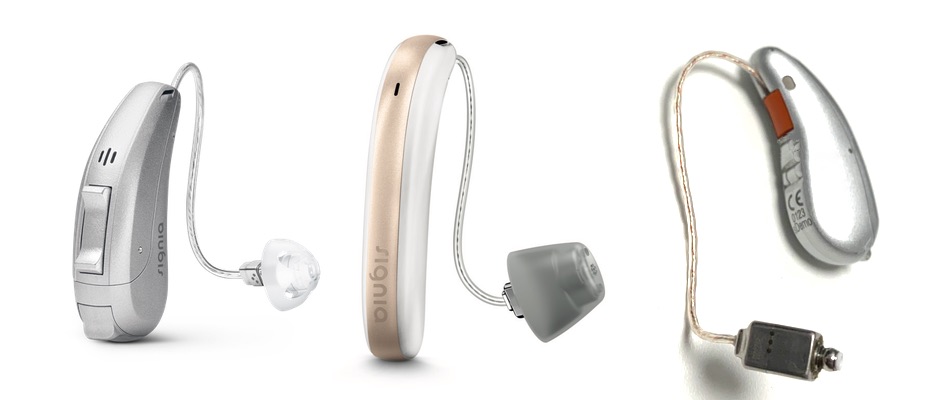Less expensive hearing aids refer to entry-level devices that allow you to make basic program settings. Your hearing loss will of course be compensated just as well with these inexpensive devices as with higher-quality ones.
This is especially true in situations where there is not much noise surrounding the wearer of the hearing aids. A cheaper hearing aid like the Intuis RIC 3 for example uses the same loudspeaker as the far more expensive Pure 7x model. The difference between them is the more sophisticated software of the pure hearing devices.
Without this software cheaper hearing aids have less sophisticated algorithms to filter noise. Some wearers hear the difference while others do not. Your local hearing care professional has different tests to measure if cheap hearing aids are worth buying for you. He or she can compare how cheap and more expensive hearing aids compare in recognizing speech in a quiet or noisy environment. After those tests, you can see how well you recognized speech with each of them.
Are Cheap Hearing Aids Bad for Your Ears?
Cheap hearing aids are not bad for your ears as long as they get fitted by a hearing care professional in combination with best practices. Some of these practices include percentile analysis or categorical loudness scaling.
Because only then the hearing care professional has the data to match the amplification levels to your individual hearing loss. When those methods are not used cheap hearing aids could be potentially bad for your ears. For example, too much amplification could damage the hair cells of your ears. The result would be less acceptance for the hearing aid devices and potentially more hearing loss.

But this is also true for expensive hearing aids which are fitted without best practices. Like when you bought your hearing aids in an online store and no professional ever looked in and at your ears.
So far, we have described conventional hearing aids that are only optimally fitted by your local hearing care professional. However, certain types of hearing aids (so-called OTC models) can also be purchased without hearing care professionals. These have been freely available for sale for some time. The changes improve access to hearing aids that are priced far below traditional hearing aids.
The only problem is that the amplification is not verified only a hearing care professional.
The basic goal of OTC hearing aids is good. More people should have their hearing loss treated with low-cost OTC hearing aids. However, access to hearing aids should also be usable in combination with optimal measurement. However, this is not the case. So, there is a high probability that certain frequencies are amplified too much or too little without being checked by a hearing care professional.
In the United States, less than 9% of people who are hard of hearing currently wear hearing aids. The percentage of people who are diagnosed with hearing loss but cannot afford hearing aids is 40%. This is why affordable hearing aids are necessary.
Hearing-impaired people take an average of 7 years from diagnosis to purchase a hearing aid. So they resist buying the devices they medically need for years and consider the high prices as the main reason for their reluctance to buy.
Are people interested in using any device without the personal recommendation of a health care professional? Probably not. A professional opinion is needed to select the best hearing aid for people with significant hearing loss. OTC hearing aids may be a solution for people with minor deficits.
Are Expensive Hearing Aids Better?
In regards to the specifications more expensive hearing aids are better. The more technology is built into a hearing aid, the more it could theoretically help you in difficult acoustic situations. This starts with automatic volume control and ends with intelligent learning hearing systems that communicate with each other. However, this does not mean the marketing speak of the hearing aids manufacturer needs to match your real-world experiences.
The question is always if an expensive hearing aid really is better for you in your daily routines. This is why it is always recommended to test different hearing aids. You could test hearing aids from different manufacturers and with different performance levels (which come with different price tags).
How big these differences in technology are subjectively perceived must be tested individually. In a quiet room, with one person speaking clearly, you will not notice a big difference with more expensive or cheaper hearing aids.
However, if you are at a party with many people talking and background music, etc., technically better-equipped hearing aids can do much more than the cheap simple devices. For whom hearing aid is best suited, you have to test individually.
By the way for a lot of people comparing hearing aids is very hard because in most cases a situation in which you had problems hearing something is hard to reproduce. But your hearing care professional has the ability to test how good an expensive or cheaper hearing aid performs for you.
Another component of more expensive hearing aids is the service. In most cases, higher prices equal better service. If you are not interested in premium service and price is king to you buying hearing aids online is your way to go. You could potentially save thousands of dollars. The downside is the high-end hearing aids will not deliver high-end performance. Because the technology of the hearing aids can only be unleashed with the correct measurements and the ideal fitting strategies.
As you can see it is worthwhile testing if cheap or expensive hearing aids are worth buying for you. Testing a pair of hearing aids for a week and then switching to another pair will give you enough experience with the device and if it works for you or not. Just make an appointment with your local hearing care professional and he will be happy to present you with the various options.
